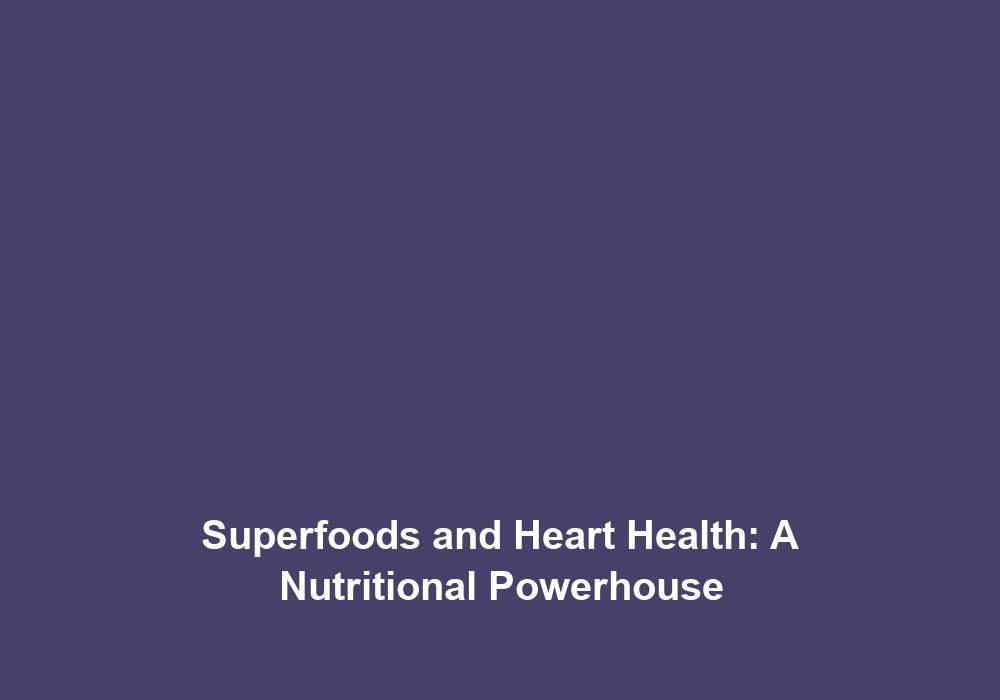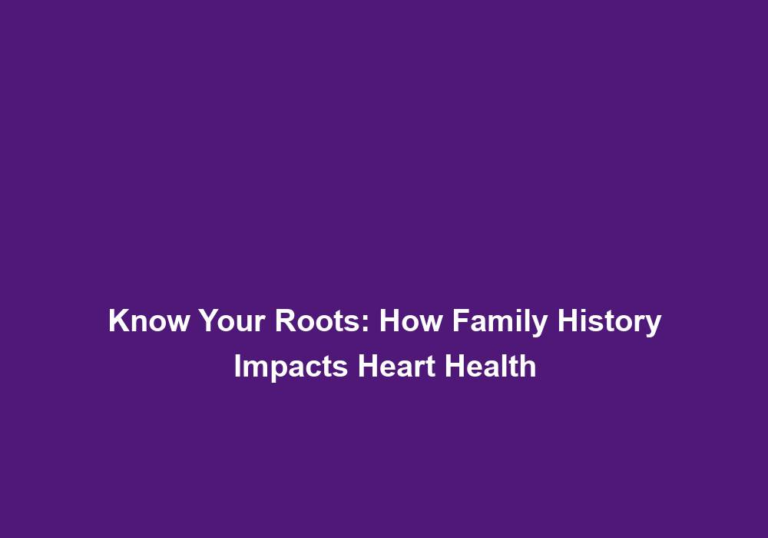Superfoods and Heart Health: A Nutritional Powerhouse
In today’s fast-paced world, maintaining a healthy heart is more important than ever. One of the key ways to support heart health is through a nutrient-rich diet. Superfoods, packed with vitamins, minerals, antioxidants, and essential nutrients, are a great addition to any heart-healthy eating plan. In this article, we will explore the relationship between superfoods and heart health, highlighting some of the top superfoods that can power up your cardiovascular system.
The Importance of Heart Health
Before delving into the world of superfoods, it’s essential to understand why heart health matters. The heart is a vital organ responsible for pumping oxygen-rich blood to all parts of the body. Poor heart health can lead to various cardiovascular diseases, including high blood pressure, heart attacks, and strokes. Adopting a heart-healthy lifestyle can lower the risk of such conditions and promote overall well-being.
Maintaining heart health is crucial because the heart is responsible for pumping oxygenated blood throughout the body. When the heart is not functioning optimally, it can lead to serious health issues such as high blood pressure, heart attacks, and strokes. By prioritizing heart health, individuals can reduce their risk of developing these conditions and improve their overall well-being.
Superfoods and Heart Health
Superfoods are nutritionally dense foods that offer numerous health benefits. When it comes to heart health, superfoods take center stage due to their ability to reduce inflammation, lower cholesterol levels, regulate blood pressure, and support overall cardiovascular health. Let’s explore some of these nutritional powerhouses:
1. Berries
Berries, such as strawberries, blueberries, raspberries, and blackberries, are rich in antioxidants, particularly anthocyanins. These antioxidants help reduce oxidative stress and inflammation in the body, lowering the risk of heart disease. Incorporating a variety of berries into your diet can provide heart-protective benefits.
Berries are not only delicious but are also packed with heart-healthy nutrients. They are rich in antioxidants, specifically anthocyanins, which have been shown to reduce oxidative stress and inflammation in the body. By including a variety of berries in your diet, such as strawberries, blueberries, raspberries, and blackberries, you can provide your heart with essential protection against disease.
In addition to their antioxidant properties, berries are also excellent sources of fiber, which can help lower cholesterol levels and promote healthy digestion. They are low in calories and sugar, making them a perfect snack or addition to smoothies, salads, or oatmeal.
2. Fatty Fish
Fatty fish, such as salmon, mackerel, and sardines, are excellent sources of omega-3 fatty acids. These healthy fats have been shown to reduce triglyceride levels, lower blood pressure, and decrease the risk of abnormal heart rhythms. Aim to include fatty fish in your diet at least twice a week for optimal heart health.
Including fatty fish in your diet can provide significant benefits for heart health due to their high omega-3 fatty acid content. Omega-3 fatty acids have been shown to reduce triglyceride levels, lower blood pressure, and promote overall cardiovascular health. By consuming fatty fish, such as salmon, mackerel, and sardines, at least twice a week, you can ensure an adequate intake of these heart-healthy fats.
In addition to omega-3 fatty acids, fatty fish are also excellent sources of high-quality protein, which is essential for muscle repair and overall health. They are also rich in vitamins and minerals, including vitamin D and selenium, which further contribute to heart health.
3. Leafy Greens
Leafy greens, including spinach, kale, and Swiss chard, are packed with vitamins, minerals, and dietary nitrates. These compounds work together to support heart health by reducing blood pressure, improving blood vessel function, and preventing the formation of blood clots. Including a variety of leafy greens in your meals is a simple way to boost your heart health.
Incorporating leafy greens into your diet is a simple yet effective way to promote heart health. Leafy greens, such as spinach, kale, and Swiss chard, are rich in vitamins, minerals, and dietary nitrates. These nutrients work together to reduce blood pressure, improve blood vessel function, and prevent the formation of blood clots.
Leafy greens are also low in calories and high in fiber, making them an excellent choice for weight management and digestive health. They can be enjoyed in salads, soups, stir-fries, or as a side dish to complement any meal.
4. Avocados
Avocados are rich in heart-healthy monounsaturated fats, which can help lower LDL (bad) cholesterol levels and increase HDL (good) cholesterol levels. They are also a good source of potassium, a mineral that promotes healthy blood pressure levels. Adding avocados to salads, sandwiches, or using them as a substitute for unhealthy fats can be a smart choice for your heart.
Including avocados in your diet can provide numerous benefits for heart health. Avocados are packed with heart-healthy monounsaturated fats, which have been shown to lower LDL cholesterol levels and increase HDL cholesterol levels. This can help reduce the risk of heart disease and improve overall cardiovascular health.
In addition to their healthy fats, avocados are also a great source of potassium, a mineral that plays a crucial role in maintaining healthy blood pressure levels. By adding avocados to salads, sandwiches, or using them as a replacement for unhealthy fats, you can enhance the nutritional value of your meals and support heart health.
5. Nuts and Seeds
Nuts and seeds, including almonds, walnuts, flaxseeds, and chia seeds, are abundant in heart-protective nutrients, such as unsaturated fats, fiber, and plant sterols. These nutrients can help reduce LDL cholesterol, decrease inflammation, and improve overall heart health. Snacking on a handful of nuts or incorporating them into your meals can provide a flavorful and heart-healthy boost.
Incorporating nuts and seeds into your diet can provide significant benefits for heart health. Nuts, such as almonds and walnuts, are rich in heart-protective nutrients, including unsaturated fats, fiber, and plant sterols. These nutrients work together to reduce LDL cholesterol levels, decrease inflammation, and improve overall heart health.
Seeds, such as flaxseeds and chia seeds, are also excellent sources of heart-healthy nutrients. They are rich in omega-3 fatty acids, fiber, and antioxidants, which can further promote cardiovascular health. By snacking on a handful of nuts or incorporating them into your meals, you can add a flavorful and heart-healthy boost to your diet.
6. Whole Grains
Whole grains, such as oats, quinoa, and brown rice, are high in fiber and essential nutrients. They have been linked to a reduced risk of heart disease, mainly due to their ability to lower cholesterol levels, improve blood sugar control, and promote a healthy weight. Replacing refined grains with whole grain options can be a simple yet effective step towards a heart-healthy diet.
Incorporating whole grains into your diet can have a significant impact on heart health. Whole grains, including oats, quinoa, and brown rice, are rich in fiber and essential nutrients. The fiber content of whole grains can help lower cholesterol levels, improve blood sugar control, and promote a healthy weight, all of which contribute to a healthy heart.
Whole grains are also a great source of vitamins, minerals, and antioxidants, which further support cardiovascular health. By replacing refined grains with whole grain options, such as whole wheat bread, brown rice, and whole grain pasta, you can make a simple yet effective step towards a heart-healthy diet.
7. Dark Chocolate
Yes, you read it right! Dark chocolate, particularly the one with at least 70% cocoa content, is a superfood for the heart. It contains flavonoids, which have antioxidant and anti-inflammatory properties. These compounds can help lower blood pressure, improve blood flow, and reduce the risk of blood clotting. Enjoying a small piece of dark chocolate as an occasional treat can be a delightful way to support heart health.
Indulging in dark chocolate can actually be beneficial for heart health. Dark chocolate, especially the one with a high cocoa content of at least 70%, is rich in flavonoids, which are antioxidants with anti-inflammatory properties. These compounds can help lower blood pressure, improve blood flow, and reduce the risk of blood clotting, all of which contribute to a healthier heart.
However, it’s important to note that moderation is key when it comes to consuming dark chocolate. While it does provide health benefits, it is still high in calories and should be enjoyed as an occasional treat rather than a daily indulgence.
Conclusion
Superfoods, with their impressive array of nutrients, play a vital role in promoting heart health. By incorporating a variety of superfoods, such as berries, fatty fish, leafy greens, avocados, nuts and seeds, whole grains, and dark chocolate, into your diet, you can take significant steps towards maintaining a healthy heart. Remember to pair a nutrient-rich diet with regular physical activity and other heart-healthy habits for optimal results. Embrace the power of superfoods and embark on a journey towards a heart-healthy lifestyle today!







